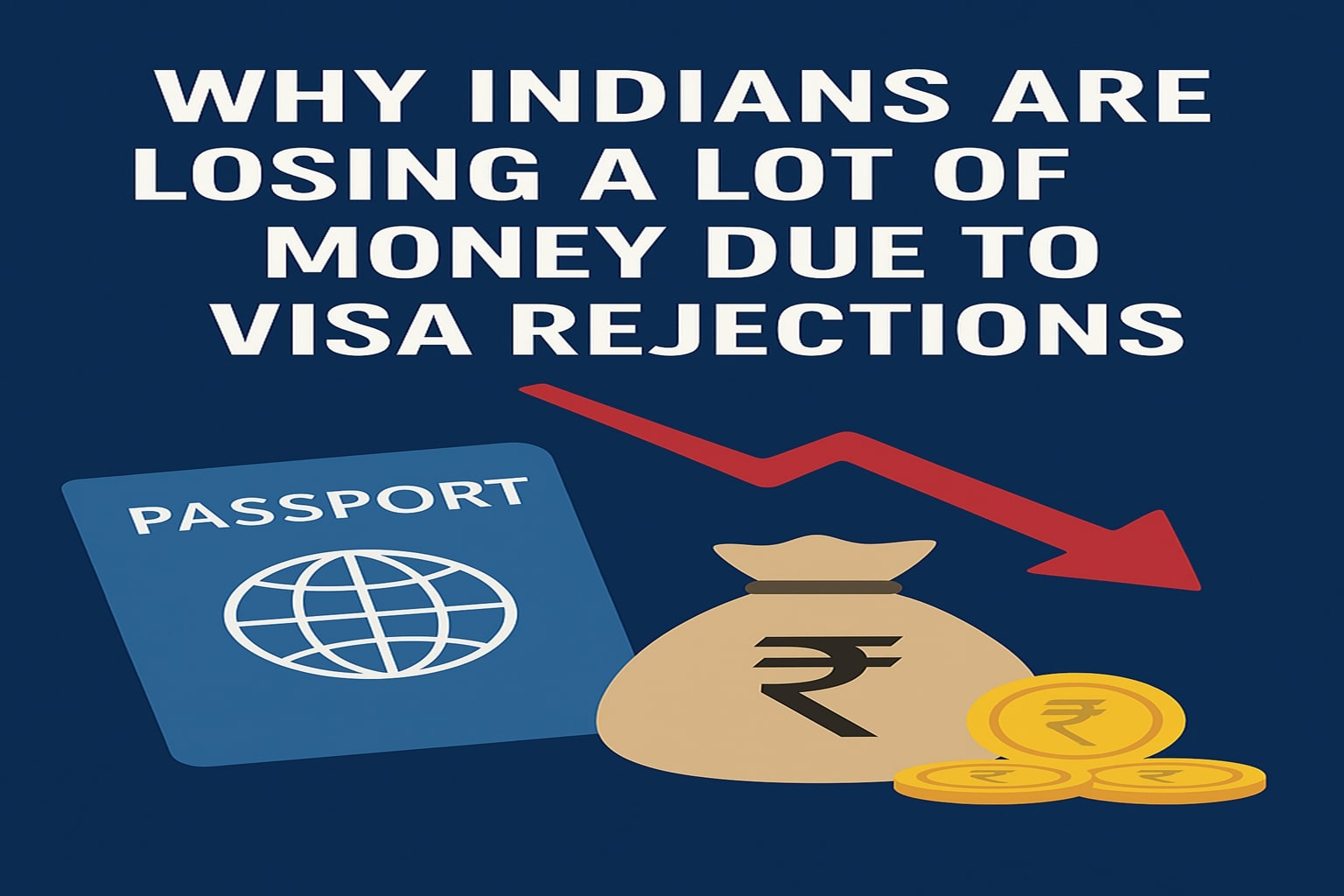
11 Sep Why Indians are losing a lot of money due to visa rejections
Visa rejection isn’t just a disappointment and a delay — for many Indians, it’s also a financial setback. The money lost isn’t only the visa fees; there are other costs, disappointments, and lost opportunities. Let’s dive into why so many applicants are paying a high price.
The Scale of the Problem
- In 2024, over 1.65 lakh Schengen visa applications from Indian citizens were rejected, leading to nearly ₹136 crore lost in non-refundable visa fees.
- Broader studies show Indians lost around ₹662 crore in total from visa refusals (US, UK, Schengen area etc.) when counting visa fees plus associated non-refundable bookings such as flights and hotels.
So, visa rejection is a major drain on personal finances for many travelers.
Why Are Visa Rejections So Czostly?
Here are the main components where money is lost:
- Non-refundable Visa Application Fees
Once you apply, the fee usually doesn’t come back even if your visa rejected. That’s a direct loss. - Advance or Non-refundable Bookings
People often book flights, hotels, and sometimes tours in advance. If visa is rejected, those bookings are either lost or severely penalized. - Travel Insurance & Other Pre-travel Costs
Some components like insurance, medical tests, notarizations, or translations, which are required ahead of time, may not be refundable or reusable. - Exchange Rate Losses & Other Ancillary Costs
When costs are paid in foreign currency (tickets, visas), an adverse rate movement or cancellation adds to the loss. Also cost of documentation, courier, etc. - Lost Opportunity Costs
Sometimes you miss out on time-sensitive things like academic deadlines, business meetings, or even seasonal travel deals.
Common Causes of Visa Rejection
Knowing why visa applications fail is essential to avoid losses. Some frequent causes include:
- Insufficient financial proof — Not showing enough funds, bank statements that don’t clearly meet the requirements.
- Poor or incomplete documentation — Missing documents, mistakes, inconsistent info.
- Weak travel intent or lack of ties to home country — Applicants not showing enough reason to return: job, property, family etc.
- Previous visa rejections — A past rejection can negatively influence newer applications, especially if not addressed properly.
- Incorrect visa category — Applying under wrong visa type (tourist vs business vs study etc.).
Stricter immigration policies globally post-COVID, with higher demand and stricter checks.
How the URL’s Advice Helps
The page Visa cancelled offers useful tips in resolving problems when a visa is cancelled or threatened:
- Acting quickly
- Collecting all relevant documentation
- Engaging legal or consultant assistance
- Checking cancellation policies and possible appeals
These are valuable for avoiding or fixing visa rejection situations.
What Can Applicants Do to Reduce the Risk (Reduce Financial Loss)
Here are some actionable steps to protect yourself:
- Understand Requirements :- Fully read embassy/visa site instructions before applying.
- Prepare Complete & Accurate Documents :-
– Verified bank statements, income proof, property documents etc.
– Proof of accommodation and travel itinerary.
– Tracked travel history if any. - Strong Intent to Return :- Show ties to India — job, family, property, any obligations you can’t abandon.
Avoid Non-Refundable Bookings Before Visa Approval:- Delay booking flights/hotels or choose refundable options wherever possible. - Use Trusted Visa Consultants :- They can help you navigate paperwork, spot potential red flags, and reduce mistakes.
- Know Your Rights & Appeal Options :- If a visa is cancelled suddenly or rejected, check if an appeal or re-application with corrections is possible — the URL page gives tips for fast resolution.
Conclusion
Visa rejection isn’t just an administrative hurdle. For many Indians, it translates to real financial loss — in fees, in bookings, and in opportunities. Being well-informed, prepared, and cautious can drastically reduce those losses. And if things do go wrong, being aware of resolution strategies (as outlined in that helpful URL) can help you recover faster.



No Comments